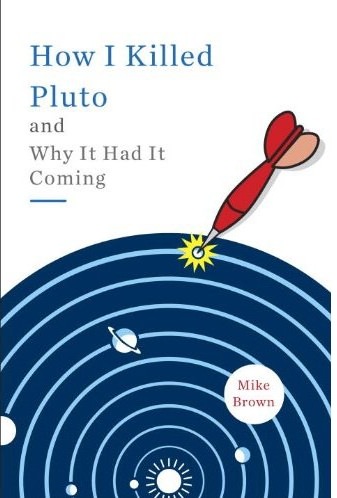http://www.universetoday.com/81092/review-how-i-killed-pluto-and-why-it-had-it-coming-plus-win-a-copy/#more-81092 wrote:

<<It’s hard to imagine, but in 1992 astronomer Mike Brown didn’t know what the Kuiper Belt was. He had never heard of it. But just a few years later in 1999, he bet another scientist that within five more years he would find another planet out there at the edge of the solar system, past Pluto. It took a five-day extension of the bet, but Brown did it. And so began the death of Pluto as a planet, but the rise of a whole new class of objects called dwarf planets. Brown has written a book about his adventures as a planet hunter and eventual planet killer, called “How I Killed Pluto and Why it Had it Coming.”
His book is a highly readable, first person account of an astronomer who, by chance, realized he had remarkable penchant for discovering small, far away objects. The book is filled with humor, candor, geeky tendencies (he thought the first sonogram of his daughter looked like images from Venera 2 spacecraft from Venus), engaging personal anecdotes – and even romance, intrigue, mystery, fatherly love, and science.
“Discovery is exciting,” Brown writes in his book, “no matter how big or small or close or distant. But in the end, even better is discovering something that is capable of transforming our entire view of the sun and the solar system.” And Brown’s discoveries have transformed our view of the solar system (some people have changed the world — how many can claim they have changed the solar system?!) The discoveries of more objects in the Kuiper Belt turned on the heat of the debate of whether everyone’s favorite misfit planet, Pluto, was actually a planet or just a member of a new, quickly growing class of what are now called dwarf planets.
From this, some will claim, our planetary mnemonic went from “My Very Educated Mother Just Served Us Nine Pizzas” to “Mean Very Evil Men Just Shortened Up Nature.” Mean and evil or educated? You decide. Find more about the book at Amazon.com (the book will be available on Dec. 7, 2010) or at Mike Brown’s website, Mike Brown’s Planets.
-------------------------------------------------
Talk about sticking to your convictions. Astronomer Mike Brown discovered an object that, at the time, was thought to be 27% bigger than Pluto. But he really didn’t want it to be a planet — he had argued against Pluto and other objects he had discovered being planets on the basis that they are in the middle of a “swarm” of similar objects. “To me it made no sense to pull one of even a few objects out of the swarm and call them something other than part of the swarm,” he wrote in his new book, “How I Killed Pluto and Why it Had it Coming.”
Universe Today had the chance to talk with Brown about his book, his discoveries, and even the latest news that perhaps Pluto actually is the biggest dwarf planet out there that we know of. Enjoy part 1 of our Q & A with Mike Brown, with part 2 coming tomorrow.
Universe Today: Over the past couple of weeks, some new discoveries have come out about the size of Eris. What are your thoughts that Pluto may actually be a bit bigger than Eris?
Mike Brown: The super-cool thing there is that when we first discovered Eris, it was great. I mean, it was fascinating for everyone in the public because we thought it was bigger than Pluto. But scientifically it really didn’t add much to our understanding of the solar system. Eris was kind of just a slightly larger twin of Pluto and nothing new was going on there. That was because we assumed it was near the larger end of the ranges of uncertainty. And by assuming that, we thought Eris was on the smaller end of density, making it the same density as Pluto. When that is the case, it is just a copy. But now that we realize it is essentially the same size as Pluto, that means Eris is a good bit more dense than Pluto, and that is actually really shocking. It tells you that these two things that formed in more or less the same place in the solar system and you would have predicted to have the same composition are essentially very different in composition. I’ve been beating my head against the wall ever since those first reports that Eris was actually smaller.
UT: Your new book, “How I Killed Pluto (and why it had it coming)” is a great read – a real page turner! How long did it take you to actually write your book?
Mike Brown: It was in fits and starts. I started it before the Pluto demotion, and I started it as sort of a ‘discovery of Eris’ book and when it looked like the IAU was going to declare it a planet. And then when it wasn’t a planet and when Pluto became part of the story I restarted it as still about Eris, but also about Pluto. In the end, the sad part of it that nobody really cares about Eris, they only care about Pluto, and so it took me awhile to get back to writing it and get to the point where I could say that this was really about Pluto as well as Eris. So it was over 2-3 years in different chunks, but the final part was a 6 month push in 2009 when I sat down and wrote the whole book.
UT: At the beginning of the book, you portray yourself as sort of stumbling into the field of looking for large objects in the Kuiper Belt. And yet here you are…
Mike Brown: I don’t know if there is any way to know ahead of time how your life is going to work out. Most people don’t have a grand plan they follow and have it work out. You start working on something and sometimes these things work out spectacularly; sometimes it works out OK, and nobody hears about it and sometimes things just don’t work out.
You see people who have done big amazing things, and you wonder how they got from here to there. Usually there is drive to do something, but everybody has to have some luck. They have to have drive and ability, as nobody does it on just luck, though. But there was no requirement that there were these large things out there in the outer solar system, and then the story would have been, “wow, what an idiot. This guy spent two years doing something and nothing came of it.” I had no way of knowing ahead of time which was going to be the answer. I’m lucky, and happy that it turned out the way it did.
UT: There was a dispute about the discovery of Haumea, where either it was an incredible coincidence that other astronomers may have found the object, too, or they may have stolen your data. In your book you say that you’re fine with not really knowing what happened – which to me is incredibly noble of you (and I think you were very noble about the whole episode). Why don’t you want to know?
Mike Brown: I don’t mean to say I don’t want to know; I would love to know. If you knew the answer and I knew I could ply you with whisky until you told me, I would go out and buy as much whisky as I could. I would love to know the answer. I don’t think I ever will, and so I’m maybe resigned to that. In my gut, I feel like I know what happened, but I really don’t. I could be wrong and then every once in a while I have doubts and say maybe these guys really didn’t do anything wrong and they had their lives ruined. It is very frustrating. I really would like to know the answer because somebody in this story is a bad person, and I hope it is not me. But, god, what if it is?
UT: You certainly gave them the opportunity to tell their side of the story and I don’t know if they really have.
Mike Brown: No, they haven’t. And it is easy to take that interpretation, and if you watch enough “Law and Order” you know that people who hide what is going on are always guilty. But at the same time I try to put myself in their shoes, where they didn’t know what they were about to stumble into, and to suddenly be barraged by the media — to which they weren’t accustomed — and not knowing what to do about it, I can imagine that they wouldn’t tell their side of the story. If everything had been on the up and up, they may have behaved the same way. Deep down inside, I don’t think so, but I don’t have certainty. And I would love to have it. Someday, somewhere, someone may walk into my office and close the door and say, “OK, I know what happened and let me tell you.’ I relish that day, but I don’t know that it will ever happen.
UT: Well, again, I thought you were very nice about the whole episode.
Mike Brown: Before writing the book, I went back and looked at all the emails back and forth about this. The crazy part for me was that my daughter was 20 days old, and these guys had just potentially done something horrible. But when I started writing about it for the book, I didn’t really remember much of it because don’t think anyone remembers much from when their children are 20 days old. I could really only reconstruct it from my own emails with them. And looking back, I am kind of proud of myself. I was really very nice. I was very supportive. I made a big website proclaiming their discovery and pointing everything to them. So, wow, on lack of sleep I’m a relatively nice guy.
Perhaps it helps having a little infant that you are carrying around for perspective as far as what is important and what isn’t. As trite and cliché-ish as that is, I think it is actually true.
UT: But yet, you seem to relish the role of “Pluto Killer”…
Check back tomorrow to find out Mike Brown answers this question, and more!>>
---------------------------




